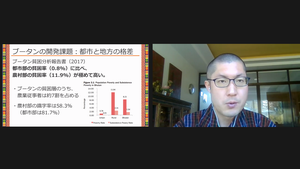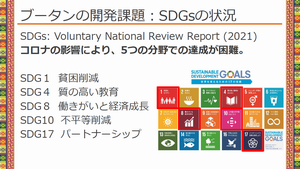- Global Collaboration Center
- Activity
- Report on 23rd SDGs (Sustainable Development Goals) Seminar “International Cooperation and Development: Bhutan's Development Challenges and Japan's Cooperation” (Dec.2022)
ページの本文です。
Report on 23rd SDGs (Sustainable Development Goals) Seminar “International Cooperation and Development: Bhutan's Development Challenges and Japan's Cooperation” (Dec.2022)
2023年4月19日更新
The 23rd SDGs Seminar was held on Thursday, December 15, from 3:00 to 4:30 pm. Mr. Suto, a project formulation officer at JICA (Japan International Cooperation Agency) Bhutan Office, gave a lecture to deepen participants' understanding of the current status of Japan’s cooperation with Bhutan and Bhutan's development, starting with Bhutan's development challenges.
Mr. Suto began his talk by focusing on the relationship between Japan and Bhutan. Bhutan uses the Gross National Happiness (GNH) indicator to determine the overall goals of the country, which has aspects similar to the SDGs indicator and aims to achieve a balance between the four pillars and nine items. Japan is the largest bilateral donor partner of Bhutan in the OECD member countries and has provided various assistance to Bhutan. JICA focuses on the three pillars: agriculture, infrastructure development, and health. JICA is also helping to build hospital, which the royal family named the Royal Centre for Infectious Disease. In this way, we have learned that Japan has a lot to do with Bhutan in terms of international cooperation.
He then focused on the development issues in Bhutan. In Bhutan, the policy direction has been determined based on the achievement of GNH, but currently there is a sense of social stagnation among younger generation due to the rising youth unemployment rate and the widening gap between urban and rural areas. Cities used to be places of opportunity for young people, but young people actually working in cities face many difficulties. On the other hand, young people in rural areas, where the poverty rate is higher than in cities, are satisfied with their current situations. In addition to the fulfillment of work and the youth's place in the community, the opening of roads in rural areas has made their lives more satisfying. The survey results which say that urban areas have lower poverty and higher literacy rates and that rural areas have higher poverty and lower literacy rates, are not enough to grasp the reality of people’s lives, about whether people are enjoying economically satisfied lives and whether they are fulfilled with their lives.
Based on these facts, we have learned that there is a reality of life satisfaction and enriched lives that cannot be seen through multifaceted indicators such as the SDGs and GNH. The talk made me think deeply about what kind of cooperation Bhutan needs in the future and what development means. Thank you very much for the valuable presentation.
(Yuka Ishida, junior student, Global Studies for Intercultural Cooperation Course, Department of Human and Social Sciences, Faculty of Letters and Education)












